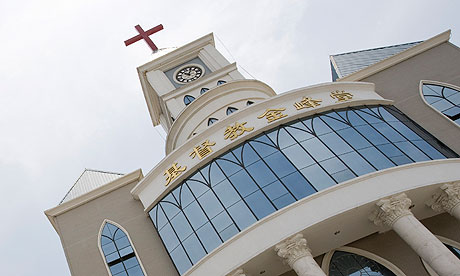
Guardian
Antonio Weiss
28 August 2010
With the state now actively financing Christianity, China could well become the largest Christian country in the world

Ever since Deng Xiaoping's relaxation of the Chinese Communist party's (CCP) suppression of religious practice in the late 1970s, Christianity has flourished in China. This has been an unexpected phenomenon, as it has been a story largely unheralded by the western media. While figures are patchy, it is estimated that the Christian missionaries (of whom the first were the Nestorians as far back as the Tang dynasty in the seventh century) that were expelled from the People's Republic of China (PRC) in 1949 left behind about half a million people baptised – the majority of whom were Catholics. Today, estimates of Christians range between 40 million and 100 million.
Mao Zedong's cultural revolution banned all forms of religious expression, driving Christians underground into "house churches". After the cultural revolution, realising the potential dangers of such uncontrolled practices, the CCP reinstated the Three-Self Patriotic Movement (TSPM) and formed the China Christian Council as the formal registered organisations of Chinese Protestants, as well as the Catholic equivalent – the Chinese Patriotic Catholic Association. The latter, critically, has no formal links with the Vatican, in large part due to CCP fears of western meddling.
During this period, house churches boomed in popularity. As the New York Times correspondent Nicholas Kristof noted, initially popular among the peasantry, Christianity's reach has extended towards the cities and the wealthy and intellectual Chinese over the last decade.
The reasons for this boom are twofold. The first is that the Chinese have found Christianity to be a stabilising belief system amid a dramatically changing socioeconomic landscape, which had its previous religious traditions crushed by Maoism and its values questioned after Tiananmen Square. And, secondly, with its obvious western heritage, the rise of Christianity may be linked to a subconscious attack on the norms and values espoused by the PRC – rather like South Korea in the 1980s.
However what is most surprising is the CCP's recent policy of actively funding and supporting state-sponsored Christian belief in China, as reported by the BBC earlier this week. According to the director general for the state administration for religious affairs, Wang Zuo An, this is due to the CCP's belief "that it should respect and protect religious belief".
This state-sponsored investment includes building Protestant and Catholic seminaries, funding academic studies into the role of religion in China, and donating land and part-financing the construction of the largest state-sanctioned church in China (for an expected 5,000 worshippers). According to Wang, there are now around 23m official Protestants in China (members of the TSPM), and that "Christianity is enjoying its best period of growth in China".
Yet this all sits rather uneasily with a state that does not allow Christians to be members of the Communist party and whose police, the Public Security Bureau, still frequently break up house church meetings (though with considerable inconsistency from province to province). According to the US group, China Aid Association, from 2005 to 2006, 1,958 Chinese Christians were arrested by the state.
The likelihood is that this policy of "accommodation" is a result of the CCP's past experiences with underground religious organisations and its acknowledgement of the potential economic prosperity that Christianity can bring. In the first instance, it would appear that conscious of the disastrously counterproductive suppression of the "spiritual movement" Falun Gong in the 1990s, the CCP believes that the threat caused by unregistered house churches is best neutralised by bringing Christianity under the auspices of the state.
While the majority of house churches do not appear to have a political agenda (though a small number of revolutionary cults have appeared in rural areas), any violent suppression of Christian groups risks provoking the ire of the west, in particular the US. Second, the recommendations of the prominent Chinese economist, Zhao Xiao, that market economies benefit from active religious groups seem to have been adopted by the CCP leadership. Perhaps eying the benefits that a strong, state-approved Christian voluntary sector could bring to China, in late 2007 President Hu Jintao announced "the knowledge of religious people must be harnessed to build a prosperous society".
On its current trajectory and with state backing, as the former Time magazine Beijing chief David Aikman notes, within three decades there may be nearly 400 million Christians in China. The future of Christianity may well lie in the east.

Nincsenek megjegyzések:
Megjegyzés küldése